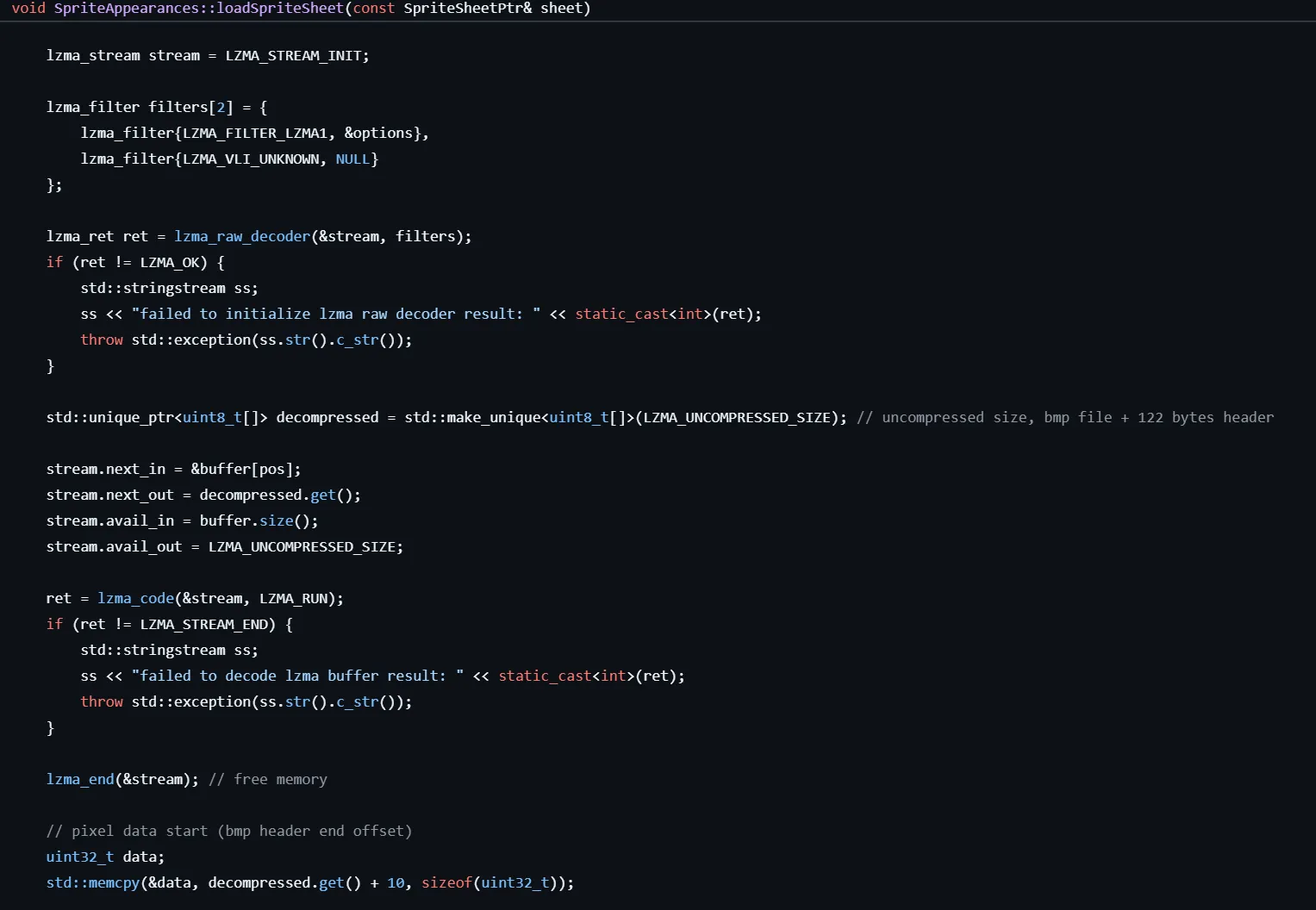Table of Contents
- Overview
- What is Protocol Buffers?
- What is Open Tibia?
- Role
- Problem
- Goal
- Solution
- Technical Implementation
- Challenges and Learnings
- Final Thoughts
Overview
ProtobufLib is a specialized C++11 library designed to streamline Open Tibia development by providing efficient parsing and exporting capabilities for appearance data stored in Protocol Buffers (protobuf) files. This library serves as a crucial development tool for managing game client data, including assets, sprites, and objects, making it easier for developers to create and customize their own Tibia servers.
The library abstracts the complexity of working with protobuf files in the context of game development, providing a clean and efficient interface for extracting and manipulating game data.
What is Protocol Buffers?
Protocol Buffers (protobuf) is an open-source, language-neutral, and platform-neutral data serialization format developed by Google. It provides an efficient way to serialize structured data for use in communications protocols, data storage, and more.
Key characteristics of Protocol Buffers:
- Language Neutral: Works across multiple programming languages
- Platform Independent: Functions on any operating system
- Efficient: Compact binary format with fast serialization/deserialization
- Extensible: Easy to add new fields without breaking existing code
- Type Safe: Strong typing system prevents common data errors
In the context of game development, protobuf is particularly valuable for storing complex game data structures like player information, world state, and asset metadata in a compact, efficient format.
What is Open Tibia?
Open Tibia is an open-source project that emulates the mechanics and gameplay of the original Tibia MMORPG (Massively Multiplayer Online Role-Playing Game). It provides a platform for developers and gaming enthusiasts to:
- Create and customize their own Tibia servers
- Experiment with game mechanics and content
- Develop new features and modifications
- Build communities around custom game experiences
Open Tibia servers allow for complete customization of the game world, including:
- Custom maps and environments
- Modified gameplay mechanics
- New items, spells, and creatures
- Custom quests and storylines
- Server-specific rules and economies
The project enables developers to understand and modify the underlying game systems, making it a valuable educational and creative platform for game development.
👨💻 Role
C++ Developer and Game Development Tools Creator
❓ Problem
Open Tibia developers faced several challenges when working with game client data:
- Complex Data Format: Game assets and appearance data were stored in protobuf format, requiring specialized knowledge to parse
- Manual Data Extraction: No efficient tools existed for extracting and manipulating game client data
- Asset Management: Difficulty in managing and organizing game sprites, objects, and other visual assets
- Development Bottlenecks: Time-consuming manual processes slowed down server development and customization
- Data Integrity: Risk of data corruption when manually editing game files
- Limited Documentation: Lack of clear documentation for working with Tibia’s data structures
🎯 Goal
- Create a robust C++ library for parsing protobuf files in Open Tibia context
- Provide efficient data extraction and export capabilities
- Enable easy manipulation of game assets and appearance data
- Improve development workflow for Open Tibia server creators
- Ensure data integrity and prevent corruption during data manipulation
- Create comprehensive documentation and examples
✨ Solution
Library Architecture
ProtobufLib provides a comprehensive solution for Open Tibia data management:
- Protobuf Parser: Efficient parsing of protobuf files containing game data
- Data Export: Multiple export formats for different use cases
- Asset Management: Tools for organizing and manipulating game assets
- Error Handling: Robust error detection and recovery mechanisms
- Memory Management: Efficient memory usage for large game datasets
Key Features
- Appearance Data Extraction: Parse and extract visual asset information
- Sprite Management: Handle game sprites and animations
- Object Data Processing: Manage game objects and their properties
- Format Conversion: Convert between different data formats
- Validation Tools: Ensure data integrity and consistency
⚙️ Technical Implementation
Core Technologies
- C++11 for high-performance data processing
- Protocol Buffers for data serialization and parsing
- Standard Template Library (STL) for data structures and algorithms
- Memory Management for efficient handling of large datasets
Key Components
- Parser Engine: Core protobuf parsing functionality
- Data Structures: Custom data structures for game assets
- Export Modules: Various export format implementations
- Utility Functions: Helper functions for common operations
- Error Handling: Comprehensive error detection and reporting
Performance Optimizations
- Streaming Parser: Process large files without loading everything into memory
- Caching System: Cache frequently accessed data for improved performance
- Parallel Processing: Utilize multiple threads for data processing when possible
- Memory Pool: Efficient memory allocation for better performance
🧪 Challenges and Learnings
-
Protobuf Complexity: Understanding and implementing proper protobuf parsing required deep knowledge of the format and its various versions
-
Memory Management: Handling large game datasets efficiently while maintaining good performance was challenging
-
Data Validation: Ensuring data integrity when parsing and manipulating game files required careful validation logic
-
Cross-Platform Compatibility: Making the library work consistently across different operating systems and compilers
-
Performance Optimization: Balancing between code readability and performance for large-scale data processing
✨ Final Thoughts
-
Community Impact: The library significantly improved the development experience for Open Tibia server creators, enabling faster and more reliable server development
-
Technical Growth: Working with protobuf and game data structures provided valuable experience in low-level data processing and optimization
-
Open Source Benefits: Making the library open source allowed the community to contribute improvements and use cases I hadn’t considered
-
Documentation Importance: Creating comprehensive documentation was crucial for adoption, especially given the technical nature of the library
-
Performance Focus: The project taught me the importance of performance optimization when dealing with large datasets and real-time applications
-
Game Development Insights: Working on this project provided deep insights into how game data is structured and managed, which is valuable knowledge for any game development work
